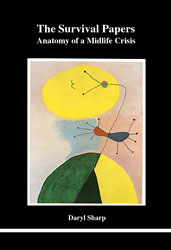I first read the Survival Papers: Anatomy of a Midlife Crisis in the 1990s when I was beginning a delayed journey through my own midlife crisis. As I read these words in the introduction to Daryl Sharp’s book, I saw an uncanny image of myself. Daryl Sharp had nailed it:
“This book is written for those in their middle years, male and female in more or less equal numbers, who have always managed quite well, have held down a job, perhaps married and had children, and then one day find that nothing works any more.”
This was me, a male who had held down a job, got married, had children and not quite all that sudden, found out that nothing worked anymore. Like so many others over the years since Sharp’s book appeared, people such as myself have discovered hope in the story of Norman, a fictional character who serves a role of analysand in the story, and a second role of illustrating complexes in action, the various faces of archetypes who lay beneath the surface of the human psyche. Norman becomes all of us and we recognise ourselves in him.
Likely the greatest value one is gifted with is the guidance through the unknowns of what happens, and the value of psychoanalysis. When midlife crisis disturbs one’s life with a conflict between the life one is living, and the sense that something is gravely missing, then and only then is there a need to enter into analysis.
“That is why the process of analysis is unproductive unless there is an active conflict. As long as outer life proceeds relatively smoothly, there is no need to deal with the unconscious. When it doesn’t, there’s no way to avoid it; we are automatically confronted with the other side.”
When I found Sharp’s book, I was already seeking counselling help but felt frustrated because it just wasn’t much more than a bandage approach to trying to fix whatever it was that felt broken. Reading the book, I gradually realised that Jungian analysis was my only hope for dealing with the shadows that hid in the darkness, shadows that had declared war on my ego.
I continued reading, highlighting so many sections that spoke out to me as though I was hearing echoes of a buried voice. Bit by bit as I turned the pages of his book, I began to believe that analysis might just be what I needed. There was no promise of being fixed. If anything, the only promise seemed to be that I would end up digging deeper and deeper into the layers, peeling one layer away at a time as if I was an onion. As Sharp went on to wander through the process of analysis with Norman, I saw that I had been invited to begin a journey that would be both enlightening and threatening. I immediately thought of the journey that Odysseus had taken across seas and foreign landscapes, a journey that ended with him finding his way home. In the process, Odysseus had changed and home had changed. That was the only promise that was given as I read the book. It was enough. I was hooked
It wasn’t long before I found myself devouring other books by Daryl Sharp and the other Jungian analysts who were featured in Sharp’s publishing venture called Inner City books. Encouraged by all that I read, I was ready to commit to working with a Jungian analyst, especially when I finally fell flat on my face and didn’t think I would ever stand upright again. Sharp’s book, The Survival Papers turned out to be exactly that for me, a route to survival.
